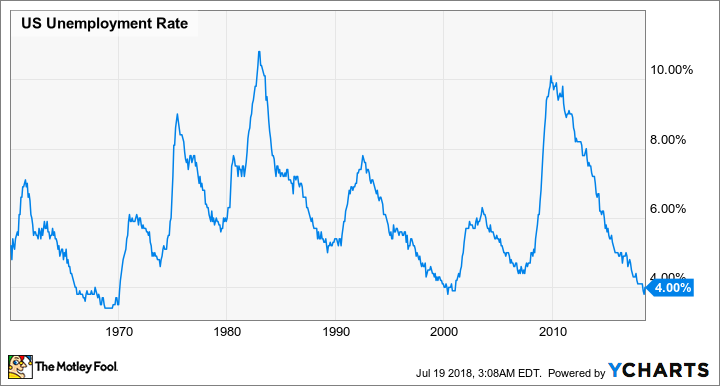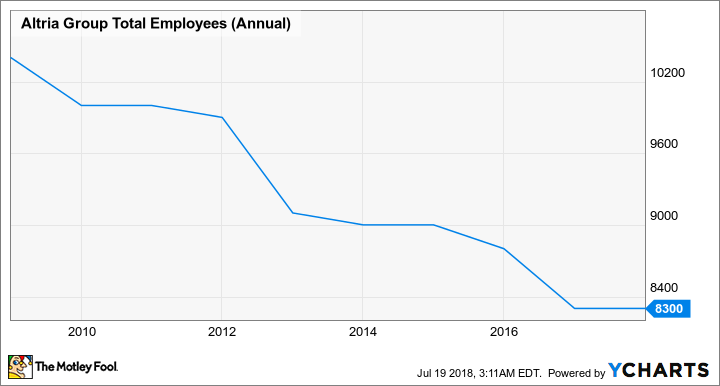Altria Claims Low-Nicotine Cigarettes Could Cost A Million US Jobs

Altria (NYSE:MO), the maker of Marlboro and the top tobacco company in America, recently claimed that the Food and Drug Administration's (FDA) plan to lower nicotine levels in cigarettes would cost the country nearly a million jobs. That's a pretty bold claim given that Altria only employed about 8,300 people at the end of 2017.
This article originally appeared in the Motley Fool.
Altria claims that the FDA's proposed measures, which could cut nicotine levels in certain cigarettes by up to 97 percent, would wipe out 589,000 retail jobs, 317,000 "indirect" jobs, 34,000 "other" jobs, and about 11,000 tobacco grower jobs — for a grand total of 951,000 lost jobs. Altria claims that those losses would raise the country's unemployment rate from 3.9 percent to 4.5 percent.
The FDA believes that forcing tobacco companies to lower their nicotine levels to a non-addictive threshold could prevent over 33 million people — mainly teens and young adults — from becoming regular smokers. The Centers for Disease Control and Prevention recently reported that U.S. smoking rates dropped to a historic low of 14 percent last year, compared to about 42 percent in the early 1960s.
If the FDA measures kick in, that figure could drop to the single digits and spell trouble for Altria. That's why the tobacco giant vehemently opposes those measures. But does its claim that lower smoking rates could cost Americans nearly a million jobs make any sense?
Altria presents a weak case
Altria uses fuzzy math to reach its 951,000 figure. The impact to tobacco growers is obvious, but the bulk of its numbers — from retail, "other," and "indirect" sources — comes from a sprawling network of manufacturers, wholesalers, and retailers. Altria claims that the new FDA measures would wipe out 45,000 U.S. businesses.
On the retail front, Altria claims that low-nicotine regulations could cause up to 42,500 convenience stores, supermarkets, and drugstores to close. By Altria's calculations, convenience stores would see an 88 percent decline in patronage and a 15 percent drop in average gross profits from adult tobacco customers.
Altria assumes that adult smokers would simply stop buying low-nicotine products from legal retailers and buy traditional nicotine products from "illicit markets" instead. It also assumes that most adult smokers would simply stop visiting these retailers if they stopped carrying traditional cigarettes. Altria notes that the average smoker visits convenience stores nearly 16 times per month, versus two visits from non-smokers.
However, CVS' (NYSE:CVS) decision to stop selling cigarettes in 2014 didn't cripple its business. That move reduced its annual sales by about 1 percent the following year, but its growth subsequently stabilized. Analysts expect CVS' revenue and earnings to rise 2 percent and 19 percent, respectively, this year.
Last year, a study by the American Journal of Public Health found that smokers who exclusively bought cigarettes at CVS became 38 percent less likely to buy tobacco products after the ban. CVS' bold move indicates that Altria's doomsday scenario for retailers is a bit far-fetched.
As for the rest of those job losses, Altria bases its calculation on a Bureau of Economic Analysis which claims that "every job loss impacts another half of a job." That might be technically true, but it doesn't account for job growth in other industries as older ones — like tobacco farming and cigarette production — die out.

This chart shows us that the U.S. unemployment rate goes through peaks and troughs, but the massive decline in smoking rates since the 1960s didn't cause a catastrophic surge in unemployment rates. That's simply because other industries grew as the tobacco giants faced slower sales growth.
As for job losses, Altria consistently laid off its own workers to preserve its own earnings and dividend growth amid tepid sales growth.

The key takeaway
It isn't surprising to see Altria fight tooth-and-nail to prevent the FDA from passing new nicotine regulations. However, the proposal for lowering nicotine levels by 97 percent was merely a "possible" policy scenario according to FDA Commissioner Scott Gottlieb.
In reality, the required reduction will likely be lower. But even if tobacco companies are forced to significantly lower nicotine levels in cigarettes, it seems highly unlikely that nearly a million U.S. jobs will be wiped out.





















